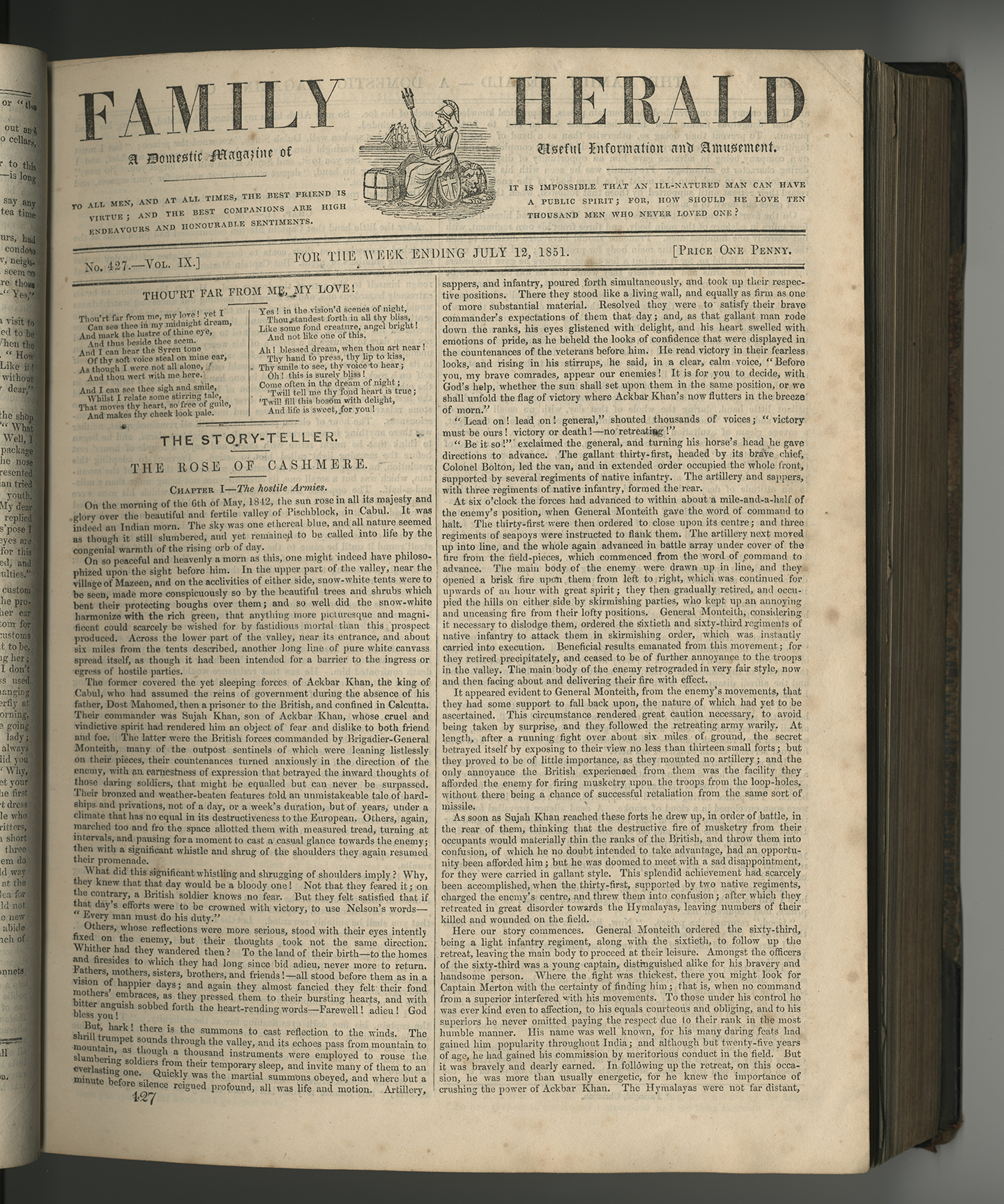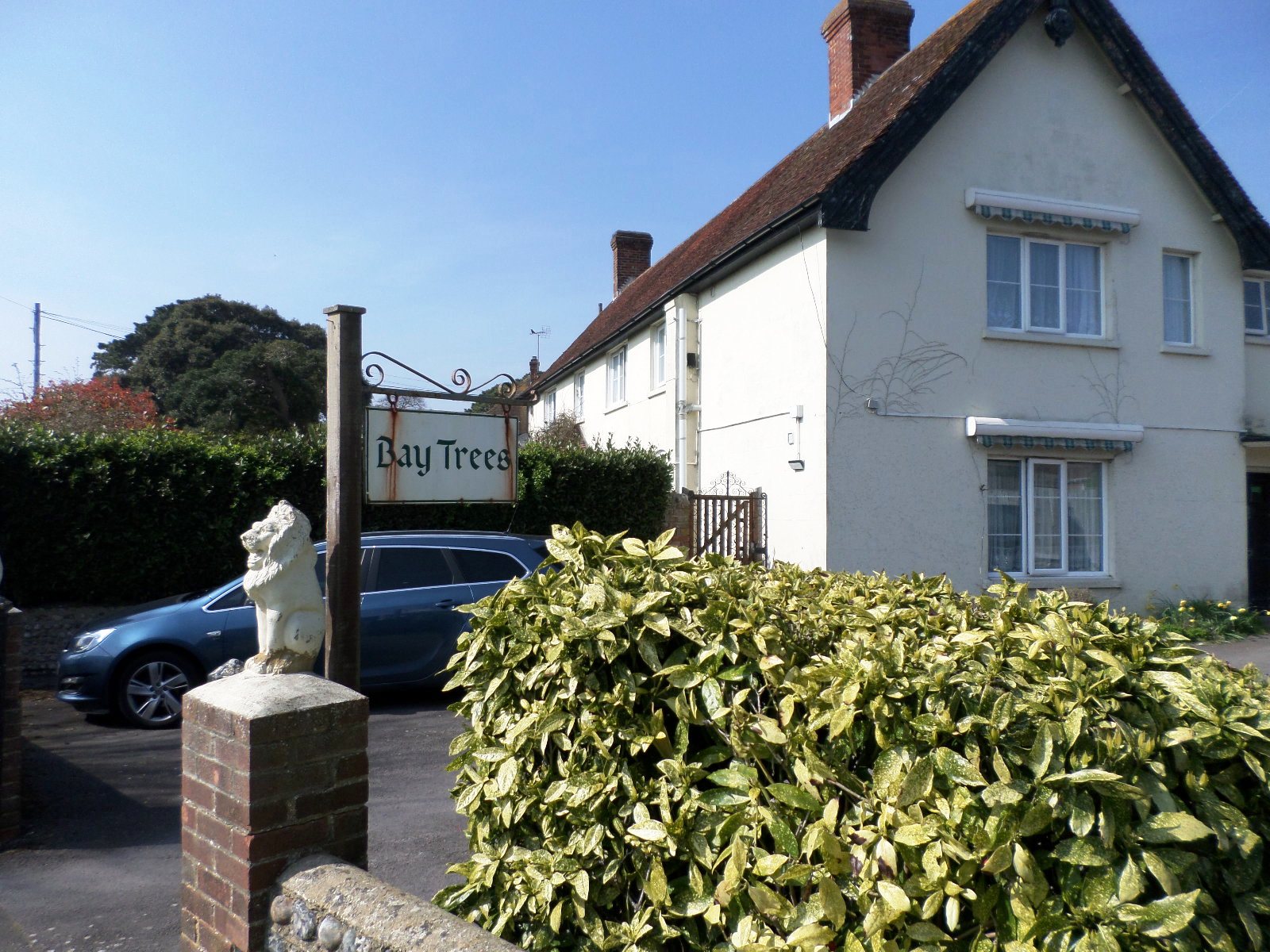|
Family Herald
''The Family Herald: A Domestic Magazine of Useful Information & Amusement'' (1843–1940) was a weekly story paper launched by George Biggs in 1842, and re-established in May 1843 with James Elishama Smith and mechanised printing. By 1855 it had a circulation of 300,000. Initially a penny weekly, the ''Family Herald'' later sold at 2d. Contributors included James George Stuart Burges Bohn, Charlotte Mary Brame (1836–84), Bertha Henry Buxton, William Carpenter (1797–1874), William Carpenter, James Hain Friswell, Fanny Aikin Kortright (1821–1900), Watts Phillips (1825–74), Frederick William Robinson (1830–1901), Nina Moore Jamieson (1885-1932), Henrietta Stannard (1856–1911), Annie Tinsley (1808–85) and Mary Cecil Hay. It is mentioned in the Sherlock Holmes story ‘ ‘The Problem of Thor Bridge’ ‘. References External linksVictorian Periodicals 1842 establishments in the United Kingdom 1940 disestablishments in the United Kingdom Weekly magazines publish ... [...More Info...] [...Related Items...] OR: [Wikipedia] [Google] [Baidu] |
Henrietta Stannard
Henrietta Eliza Vaughan Stannard (née Palmer; 1856–1911) writing under the pseudonym of John Strange Winter, was a British novelist. She was founding president of the Writers' Club in 1892, and president of the Society of Women Journalists in 1901 to 1903. Early life and education She was born on 13 January 1856 in Trinity Lane, York, the only daughter of Henry Vaughan Palmer, rector of St. Margaret's, York, and his wife Emily Catherine Cowling. Her father had been an officer in the Royal Artillery before taking religious orders, and was descended from several generations of soldiers. Her great-great-great-grandmother was the actress Hannah Pritchard. Henrietta was educated at Bootham House School, York. Career In 1874, she began her career as a novelist by writing under the pseudonym of 'Violet Whyte' for the ''Family Herald.'' Her connection with that journal lasted for ten years, and she contributed to it 42 short stories issued as supplements, besides many long serials. ... [...More Info...] [...Related Items...] OR: [Wikipedia] [Google] [Baidu] |
Defunct Literary Magazines Published In The United Kingdom
{{Disambiguation ...
Defunct (no longer in use or active) may refer to: * ''Defunct'' (video game), 2014 * Zombie process or defunct process, in Unix-like operating systems See also * * :Former entities * End-of-life product * Obsolescence Obsolescence is the state of being which occurs when an object, service, or practice is no longer maintained or required even though it may still be in good working order. It usually happens when something that is more efficient or less risky r ... [...More Info...] [...Related Items...] OR: [Wikipedia] [Google] [Baidu] |
Weekly Magazines Published In The United Kingdom
{ ...
Weekly, The Weekly, or variations, may refer to: News media * ''Weekly'' (news magazine), an English-language national news magazine published in Mauritius *Weekly newspaper, any newspaper published on a weekly schedule *Alternative newspaper, also known as ''alternative weekly'', a newspaper with magazine-style feature stories *''The Weekly with Charlie Pickering'', an Australian satirical news program *''The Weekly with Wendy Mesley'', a Canadian Sunday morning news talk show *''The Weekly'', the original name of the television documentary series ''The New York Times Presents'' Other *Weekley, a village in Northamptonshire, UK *Weeekly, a South Korean girl-group See also * *Weekly News (other) *Weekley (surname) Weekley is a surname. Notable people with the surname include: * Boo Weekley (born 1973), American professional golfer * Ernest Weekley (1865–1954), British philologist * Frieda Weekley (1879–1956), German translator * Jim Weekley James F. ... [...More Info...] [...Related Items...] OR: [Wikipedia] [Google] [Baidu] |
1940 Disestablishments In The United Kingdom
Year 194 ( CXCIV) was a common year starting on Tuesday (link will display the full calendar) of the Julian calendar. At the time, it was known as the Year of the Consulship of Septimius and Septimius (or, less frequently, year 947 ''Ab urbe condita''). The denomination 194 for this year has been used since the early medieval period, when the Anno Domini calendar era became the prevalent method in Europe for naming years. Events By place Roman Empire * Emperor Septimius Severus and Decimus Clodius Septimius Albinus Caesar become Roman Consuls. * Battle of Issus: Septimius Severus marches with his army (12 legions) to Cilicia, and defeats Pescennius Niger, Roman governor of Syria. Pescennius retreats to Antioch, and is executed by Severus' troops. * Septimius Severus besieges Byzantium (194–196); the city walls suffer extensive damage. Asia * Battle of Yan Province: Warlords Cao Cao and Lü Bu fight for control over Yan Province; the battle lasts for over 100 d ... [...More Info...] [...Related Items...] OR: [Wikipedia] [Google] [Baidu] |
1842 Establishments In The United Kingdom
__NOTOC__ Year 184 ( CLXXXIV) was a leap year starting on Wednesday (link will display the full calendar) of the Julian calendar. At the time, it was known as the Year of the Consulship of Eggius and Aelianus (or, less frequently, year 937 ''Ab urbe condita''). The denomination 184 for this year has been used since the early medieval period, when the Anno Domini calendar era became the prevalent method in Europe for naming years. Events By place China * The Yellow Turban Rebellion and Liang Province Rebellion break out in China. * The Disasters of the Partisan Prohibitions ends. * Zhang Jue leads the peasant revolt against Emperor Ling of Han of the Eastern Han Dynasty. Heading for the capital of Luoyang, his massive and undisciplined army (360,000 men), burns and destroys government offices and outposts. * June – Ling of Han places his brother-in-law, He Jin, in command of the imperial army and sends them to attack the Yellow Turban rebels. * Winter – Zh ... [...More Info...] [...Related Items...] OR: [Wikipedia] [Google] [Baidu] |
Mary Cecil Hay
Mary Cecil Hay (10 January 1839 – 24 July 1886) was a British novelist. Her work was often serialised and appeared in periodicals and weeklies in the UK, America and Australia. Background and early influences Mary Hay was born in Shrewsbury to clockmaker Thomas William Hay (1791–1856) and Cecilia Carbin (1798–1888). There were seven children in the family, four boys and three girls, all baptised in a non-conformist independent church. The eldest boy, John (1821-1821) died in infancy. The next oldest son, Arthur Kenneth (1824–1839), committed suicide at the age of fifteen. The middle son, Walter Cecil Hay FRAM (1828–1905), became an organist and music teacher, whilst the youngest son, Thomas William (1836–1873), followed his father into the clock-making business. Mary and her two sisters, Francis Ann (1830–1884) and Susan Elizabeth, an artist (1840–1908) remained unmarried and continued to live at home with their mother. Mary's father died in 1856 aged sixty-fi ... [...More Info...] [...Related Items...] OR: [Wikipedia] [Google] [Baidu] |
ODNB
The ''Dictionary of National Biography'' (''DNB'') is a standard work of reference on notable figures from British history, published since 1885. The updated ''Oxford Dictionary of National Biography'' (''ODNB'') was published on 23 September 2004 in 60 volumes and online, with 50,113 biographical articles covering 54,922 lives. First series Hoping to emulate national biographical collections published elsewhere in Europe, such as the '' Allgemeine Deutsche Biographie'' (1875), in 1882 the publisher George Smith (1824–1901), of Smith, Elder & Co., planned a universal dictionary that would include biographical entries on individuals from world history. He approached Leslie Stephen, then editor of the '' Cornhill Magazine'', owned by Smith, to become the editor. Stephen persuaded Smith that the work should focus only on subjects from the United Kingdom and its present and former colonies. An early working title was the ''Biographia Britannica'', the name of an earlier eig ... [...More Info...] [...Related Items...] OR: [Wikipedia] [Google] [Baidu] |
Annie Tinsley
Annie Tinsley, born Annie Turner (11 January 1808 – 20 January 1885), was a British novelist and poet. She used the name Mrs Charles Tinsley. Life Tinsley was born in Preston in 1808. She claimed to have read "the classics" at an early age and she published her first set of poetry at her own risk in 1826. The collection was called ''The Children of the Mist and other Poems'' and it bore the date of 1827. The publication made a loss and even although she was still a child in the eyes of the law she could have been sent to prison, albeit illegally. However she met her husband Charles Tinsley and they married. Usefully he was a solicitor but he was a poor one. Tinsley had to turn herself into a hack writer to raise funds. She said that she was so desperate that she did not check her work, but just moved on to the next task. She ignored poetry and wrote for periodicals including '' Family Herald'', the '' Monthly Chronicle'', the '' Metropolitan Magazine'', ''People's Journal'' and ... [...More Info...] [...Related Items...] OR: [Wikipedia] [Google] [Baidu] |
Nina Moore Jamieson
Nina 'Pat' Moore Jamieson (29 April 1885 – 6 November 1932), was an Irish born Canadian teacher, journalist, poet and lecturer. Life She was born in Belfast, Ireland in 1885. Her parents William Francis Moore and Georgette Robinson were Canadian and took her back to Canada. She grew up in Cookstown and Dundas, Ontario. Jamieson attended Hamilton (Ontario) Model School and got training in domestic science. She became a teacher, following in her father's line of work. But she worked for several years before getting her qualifications from the Winnipeg Normal school. She was known as Pat to her family and friends. On 23 October 1907 Jamieson married farmer Norman Jamieson and they had four children. She worked for the Ontario Department of Agriculture. Jamieson spent time lecturing to Women's Institutes and the Imperial Order Daughters of the Empire. During the First World War, encouraged by her mother and husband, Jamieson began to send her work to ''The Mail and Empire''. Sh ... [...More Info...] [...Related Items...] OR: [Wikipedia] [Google] [Baidu] |
James Elishama Smith
James Elishama Smith, often called Shepherd Smith (1801, Glasgow – 1857, Glasgow) was a British journalist and religious writer. Smith studied at Glasgow University. Hearing Edward Irving preach in 1828, he became a millenarian and associated with followers of Joanna Southcott. For a couple of years he became a Christian Israelite under John Wroe. He moved to London in 1832, and his millenarianism turned socialist. He translated Saint-Simon, edited Robert Owen's journal ''Crisis'', and wrote for James Morrison's ''Pioneer''. Smith edited ''The Shepherd'' 1834–5 and 1837–8, and wrote leaders for the ''Penny Satirist A penny is a coin ( pennies) or a unit of currency (pl. pence) in various countries. Borrowed from the Carolingian denarius (hence its former abbreviation d.), it is usually the smallest denomination within a currency system. Presently, it is th ...''. In 1843 he founded a penny weekly, the '' Family Herald'', which at one point approached a circulation o ... [...More Info...] [...Related Items...] OR: [Wikipedia] [Google] [Baidu] |
Frederick William Robinson
Frederick William Robinson (23 December 1830 – 6 December 1901) was an English novelist, magazine editor and drama critic. Life Robinson was born in Spitalfields in 1830, the second son of William Robinson of Acre Lane, Brixton, who owned much house property in London. His mother's surname was St John. After his education he acted for some time as his father's secretary, but he soon embarked upon a literary career, his first novel ''The House of Elmore'', begun before he was eighteen, being published in 1855. It met with success and was followed by upwards of fifty other works of fiction. ''Grandmother's Money'' (1860) secured a wide vogue, which was maintained in an anonymous series of semi-religious novels: ''High Church'' (1860); ''No Church'' (1861); ''Church and Chapel'' (1863); ''Carry's Confession'' (1865); ''Beyond the Church'' (1866), and ''Christie's Faith'' (1867). He was equally successful with two works of a different character: ''Female Life in Prison, by a Prison ... [...More Info...] [...Related Items...] OR: [Wikipedia] [Google] [Baidu] |


